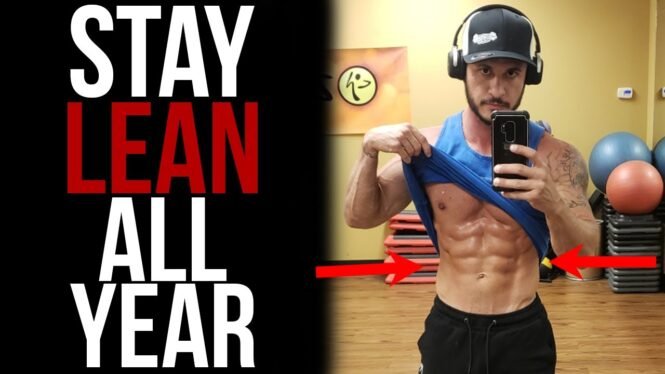Looking to stay fit and lean as a man over 30? While it may feel like your metabolism is slowing down, there are still plenty of effective strategies to help you achieve your goals. In this blog post, we’ll explore seven proven ways to stay lean and healthy as you age, from adjusting your diet to incorporating targeted workouts into your routine. Whether you’re new to fitness or a seasoned pro, these tips are sure to help you maintain a strong and healthy body well into your 30s and beyond.
7 Ways to Stay Lean for Men Over 30
Introduction
Maintaining a lean physique can be tough for men over 30 who have busy schedules and a lot on their plate. However, following a few key tips and staying consistent is the key to achieving a lean body all year round. In this article, we will cover seven simple ways for men over 30 to stay lean and fit.
1. Keep a consistent exercise routine
Having a consistent exercise routine is essential for maintaining a lean body. Include weight lifting, cardio and other functional training exercises in your routine. Weightlifting can help to build muscle mass, Cardio exercises like running, jumping rope or biking can help to burn calories and improve heart health. Functional training is a great way to improve overall fitness and can help improve athletic performance. Following a consistent exercise routine will keep fat loss in check, improve muscle mass, and keep you lean all year long.
2. Eat a high protein diet
Protein is essential for maintaining your hard-earned muscles. Men over 30 need more protein, as our bodies tend to start losing muscle mass at this age. Therefore, it’s important to consume a high-protein diet consisting of lean meats such as chicken breast, fish, turkey and beef, egg whites, beans, and legumes. Making sure you consume enough protein is important for maintaining a healthy metabolism, reducing hunger and preserving the muscle you have worked hard to build.
3. Practice Intermittent Fasting
Intermittent fasting is becoming a popular trend for men who want to stay lean. Intermittent fasting involves cycling between periods of fasting and eating. This method has been shown to increase fat loss, regulate blood sugar levels and decrease insulin resistance. A common way to fast is the 16/8 method. This involves fasting for 16 hours and eating within an 8-hour window, which means skipping breakfast and eating lunch as the first meal of the day. This method can also enhance brain function and help to increase natural growth hormone secretion.
4. Get enough sleep
Sleeping plays an important part in keeping a lean physique. It helps reduce cortisol, the hormone that causes stress and increases the tendency to store fat. Lack of sleep also tends to increase hunger and cravings, which can lead to overeating and hinder your progress. Getting 7-8 hours of sleep each night will give the body adequate time to recover, repair and build muscle, which is essential for maintaining a lean physique.
5. Reduce Alcohol Intake
Alcohol contains empty calories and can hinder your weight loss goals. While it’s not necessarily harmful to have the occasional drink, consuming alcohol on a regular basis is not recommended if you want to stay lean. Alcohol can interfere with the body’s fat metabolism and increase appetite, making it harder to maintain a healthy diet. Cutting down or eliminating alcohol altogether can produce significant progress in weight loss and overall health.
6. Track Progress
Tracking progress is important for understanding where you are and where you want to be. Keeping track of your weight loss journey, including weight, body fat percentage, and measurements, will help you stay accountable and motivated. You can do this by creating a chart or using a fitness tracking app. Tracking will provide a visual representation of your progress and allow you to make any necessary changes to your routine to achieve your goals easily.
7. Stay Consistent
Consistency is key when it comes to fitness and health. This means following a healthy diet, working out regularly, getting enough sleep, and quantity of water every day. Staying consistent is essential for maintaining your lean physique all year round. Habits take time to form, so don’t expect immediate results. Slow and steady progress is the best way to succeed, and you can take satisfaction in knowing that you’re doing the best you can to maintain a healthy and lean body.
Conclusion
Maintaining a lean physique is a continuous process, but applying these seven simple tips can help you achieve and maintain it all year round. Remember to stay consistent each day, making healthy choices and tracking your progress along the way. Practice intermittent fasting, consume high protein diets, get enough sleep and avoid alcohol, and ensure you have a consistent exercise regime. With all the right steps, you can stay lean and healthy beyond your 30s.
FAQs
-
Can I eat carbohydrates to stay lean?
Yes, carbohydrates are essential for optimal metabolic functioning, brain health, and athletic performance. You can consume them in moderation in combination with adequate amounts of protein and healthy fats. -
Can I take supplements or protein powders to stay lean?
Protein powders and other supplements can be beneficial for helping you reach your daily protein goals or other vitamins and minerals, but a balanced meal plan is still essential for optimal health and weight loss. -
Can I drink coffee or tea while intermittent fasting?
Coffee or tea with little to no sugar or creamer is acceptable to drink while fasting. Just remember that consuming caffeine on an empty stomach may affect your sleep and should be avoided. -
Should I weigh myself every day?
It’s not recommended to weigh yourself every day as weight can fluctuate for several reasons. It’s better to weigh yourself once a week at the same time. -
Can I apply these tips if I’m over 50?
Yes, the same tips can apply to all ages. However, consult with your healthcare provider and nutritionist for advice on specific dietary and exercise requirements that are age-appropriate.



